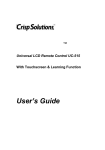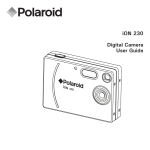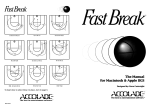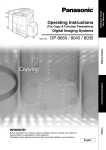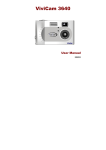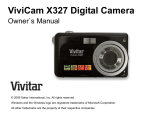Download Vivitar 3765 Digital Camera User Manual
Transcript
INSTRUCTION MANUAL 3 Mega Pixel Digital Camera About this Manual This manual makes using the ViviCam 3765 Camera as easy as possible. Information in this manual has been checked for accuracy; however, the information is subject to change without notice. Copyright (c) Copyright 2004 Vivitar Corporation This document contains proprietary information protected by copyright. All rights are reserved. Trademarks All trademarks and registered trademarks are the property of their respective owners. Microsoft® and Windows® are U.S. registered trademarks of Microsoft Corporation. Pentium® is a registered trademark of Intel Corporation. Rev tpiehn 031215 Table of Contents Chapter 1 – Getting Started .............................................................. 1 Safety Information .................................................................. 2 Included Components .......................................................... 4 Camera Overview.................................................................. 5 Front View................................................................... 5 Back View................................................................... 7 Bottom View............................................................. 10 Inserting a Memory Card .................................................... 11 Installing the Batteries .......................................................... 13 Selecting a Language ......................................................... 15 Setting the Time and Date .................................................. 17 Chapter 2 - Capturing Images ........................................................ 21 Preparing the Camera ........................................................ 21 Selecting the Camera Mode ............................................. 22 Framing the Shot................................................................... 22 Zooming and Shooting ........................................................ 23 Turning off the Camera ....................................................... 23 Chapter 3 - Reviewing Your Images ............................................... 24 Switching to Playback Mode ............................................. 24 Full-Screen Review .................................................. 24 Thumbnail Review ................................................... 25 Chapter 4 - Connecting to a Computer ....................................... 26 Installing Software................................................................. 28 Transferring Images to your Computer ............................. 31 PC/web Camera mode ...................................................... 31 Chapter 5 - Mode / Operation Guide............................................ 33 (Still-Image) Capture Mode................................................ 33 Movie Mode .......................................................................... 34 Preset Modes......................................................................... 35 Landscape ............................................................... 35 Portrait....................................................................... 36 Night Scene.............................................................. 36 Self-Timer................................................................... 36 Macro........................................................................ 37 Playback Mode .................................................................... 37 Setup Mode........................................................................... 38 Delete All .................................................................. 39 Format....................................................................... 39 Quality....................................................................... 40 Buzzer ........................................................................ 41 Date/Time................................................................. 41 Memory Type ........................................................... 42 Language................................................................. 43 Video Out ................................................................. 43 ISO.............................................................................. 44 Welcome Screen..................................................... 44 PC/Web Camera Mode...................................................... 45 Chapter 6 - the LCD Display ............................................................ 46 LCD Icon Descriptions.......................................................... 47 Appendix 1 – Button Function Guide ............................................. 49 Appendix 2 – Troubleshooting Guide ............................................. 50 Chapter 1 – Getting Started This chapter provides an overview of the features of the Vivicam 3675 camera overview and instructions on getting started. V3765 Features: • • • • • • • • • • • • • • • 3x Optical Zoom, 4x Digital Zoom Autofocus lens with macro function Native resolution of 2048 x 1472 Interpolated resolution up to 2496 x 2016 Color LCD viewfinder screen Optical viewfinder 16 MB Internal memory (14 MB available for image storage) Uses Secure Digital (SD) or MMC memory cards (not included) for memory expansion (up to 256 MB) Movie Clip Recording capability, with audio USB 1.1 interface (Mass-storage class) Automatic exposure with user-defined exposure capability Four-mode integral Flash Automatic White Balance with Preset Modes 10-second Timer mode Full screen or Thumbnail image review V3765 Digital Camera User’s Manual Safety Information • • • • • • 2 Do not look at the sun through the viewfinder. Viewing the sun or other strong light source through the viewfinder could cause permanent visual impairment. Do not disassemble the camera. Touching the internal parts could result in injury. In the event of a malfunction take the product to an authorized service center for inspection. Avoid contact with liquid crystal. Should the LCD display break, care should be taken to avoid injury due to broken glass. Prevent the liquid from touching the skin, eyes, or mouth. Observe proper precautions when handling batteries. The camera uses only size AA batteries. Batteries may leak or explode if handled improperly. Remove the batteries from the camera if you are going to store the camera for an extended period of time. Ensure the camera is turned off before inserting or removing batteries. Do not expose batteries to flame or excessive heat. Discontinue use immediately if you notice any changes in the battery such as discoloration, deformation or leakage. Observe caution when operating the flash. Do not use the flash close to anyone's eyes. This can cause temporary damage to eyesight. Particular care should be observed when imaging infants - keep the flash at a distance of at least 1 meter from infants' eyes. WARNING: Handling the USB and Video cables on this product may expose you to lead, a chemical known to the State of California to cause birth defects or other reproductive harm. Wash your hands after handling. Safety Information FCC STATEMENT This device complies with Part 15 of the FCC Rules. Operation is subject to the following two conditions: 1. This device may not cause harmful interference, and 2. This device must accept any interference received, including interference that may cause undesired operation. Note: This equipment has been tested and found to comply with the limits for Class B digital devices, pursuant to Part 15 of the FCC rules. These limits are designed to provide reasonable protection against harmful interference in a residential installation. This equipment generates, uses and can radiate radio frequency energy and, if not installed and used in accordance with the instructions, may cause harmful interference to radio communications. However, there is no guarantee that interference will not occur in a particular installation. If this equipment does cause harmful interference to radio or television reception, which can be determined by turning the equipment off and on, the user is encouraged to try to correct the interference by one or more of the following measures: 1. Reorient or relocate the receiving antenna 2. Increase the separation between the equipment and receiver 3. Connect the equipment into an outlet on a circuit different from that to which the receiver is connected 4. Consult the dealer or an experienced radio/TV technician for help Use of shielded cable is required to comply with Class B limits in Subpart B of Part 15 of the FCC rules. Do not make any changes or modifications to the equipment unless otherwise specified in the manual. If such changes or modifications should be made, you could be required to stop operation of the equipment. 3 V3765 Digital Camera User’s Manual Included Components The V3765 digital camera typically comes equipped with the following components. Check to make sure all items are included. Note, however, that included accessories and components will vary, as specified by different retailers. Check with your retailer for specifics. 4 1. User's Manual 5. Quick Reference Guide 2. Soft Carrying Case 6. V3765 Digital Camera 3. Two (2) AA Alkaline Batteries 7. Installation CD-ROM 4. Video Cable 8. USB Cable Camera Overview Camera Overview The front, rear, and bottom views of the camera are shown on the following pages. Take a moment to review these illustrations to familiarize your self with the terms used in this manual. Front View 1. Shutter Button: Press this button to capture images, or to select menu options. 2. Integral Flash: The flash allows the camera to capture images in low light conditions and can 5 V3765 Digital Camera User’s Manual 3. 4. 5. 6. 7. 6 also be used in bright conditions to fill unwanted shadows. Self-Timer LED: When the Self-Timer option is selected this LED blinks for ten seconds after the Shutter Button is pressed. At the end of the tensecond countdown the camera captures an image. Light Sensor: Light measurements are made with this sensor. The camera detects the ambient light level and determines whether or not the flash should fire. Be careful not to block this sensor while capturing images. Viewfinder: The viewfinder helps you frame an image. The actual image, however, is captured with the lens and not the viewfinder. For macro shots (close ups) use the LCD display for framing accuracy. Lens: The lens focuses light onto the image sensor. For the optimal image quality, care should be taken to ensure that the lens remains free of dust, fingerprints, and scratches. Microphone: Records audio when you use the camera for capturing movie clips. Camera Overview Rear View 1. Status LED: This LED will flash orange when the camera is powered-on, or while the camera is processing an image. When the camera is again ready to capture an image or accept user commands, the LED will be solid green. 2. Optical Viewfinder: The optical viewfinder is used to frame your images. The optical viewfinder is essential for conditions of extreme brightness or darkness. The actual image is captured through the lens and not the viewfinder. 7 V3765 Digital Camera User’s Manual 3. 4. 5. 6. 7. 8. 9. 10. 8 Power Button: Press this button to turn on the camera. Press it again to turn the camera off. WB/Delete: In capture mode press this button to cycle through White Balance presets. In playback mode use this button to delete images. Strobe / Copy: In capture mode this button sets the flash mode. In playback mode, it copies images from internal camera memory to an SD/MMC Card (if present.) Zoom Out Key: In capture mode, press this key to zoom out. In playback mode if pressed repeatedly it switches between thumbnail and full-screen views. If zooming in on an image during Playback, pressing this key zooms back out again. Zoom In Key: In capture mode, press this key to zoom in on your subject. In Playback mode, use this key to zoom in on an image. Shutter Button: Press this button to capture a digital image. When navigating the camera's options menus, use it to select menu items. Power Jack: Use this plug if using an AC Adapter or an external power source. (Not included) Video Out Jack: Connect the video cable here (and the other end to your television set) to use the camera as a digital video camera or to playback your images on a TV. Camera Overview 11. 12. 13. 14. 15. 16. 17. USB Port: The USB (Universal Serial Bus) port is used to connect the camera to a computer for transferring images. The USB port also enables PC users to use the camera as a PC/web Camera. Hand Strap Loop: Attach the hand strap to this loop for ease of carrying. Mode Dial: Rotate to select the camera mode: Movie, Preset, Capture, Playback, Setup, or PC/web Camera. Down Button: Used to move down through menus and to cycle to the next during image Playback. Up Button: Used to move up through menus and to cycle to the previous image during image Playback. Display Button: Press to cycle through the various display options: LCD, backlight and status information; LCD and backlight; LCD off; histogram. LCD Display: You may use the LCD display to preview and frame your images. Always use the LCD display for framing macro shots. In conditions of extreme brightness or darkness use the optical viewfinder. While in the Setup menu, use the LCD to view messages and configure the camera. 9 V3765 Digital Camera User’s Manual Bottom View 1. Tripod Socket: Attaches the camera to a common tripod using the popular ¼-20 thread. (Tripod not included.) Use a tripod to hold the camera steady, especially for low light night images. 2. Battery / Memory Card Cover: Opens to allow access to the battery chamber and memory card slot. 3. Memory Card Slot: Holds an optional SD or MMC memory card to store images. For more information on memory cards refer to other sections of this manual including “Memory Type” 4. Battery Chamber: Requires two AA alkaline batteries. You may also use AA NiMH rechargeable batteries. 10 Inserting a Memory Card Inserting a Memory Card To insert a memory card: 1. Turn off the camera. 2. Open the battery / memory card compartment by pressing the cover and sliding in the direction of the arrow as shown. 11 V3765 Digital Camera User’s Manual 3. Insert the memory card with circuitry (pins) first. The notched corner of the memory card points towards the camera lens. The manufacturers label on the memory card will face the front (lens side) of the camera. Notch 4. Close the battery / memory card cover. Note: The maximum usable memory card for the 3765 camera is 256 MB 12 Installing the Batteries Installing the Batteries To install or replace the batteries: 1. Turn off the camera. 2. Open the battery compartment on the bottom of the camera by pressing the cover and sliding in the direction of the arrow as shown. 13 V3765 Digital Camera User’s Manual 3. Insert batteries into the chamber making sure that the positive and negative ends are properly oriented, as indicated by the battery icons in the compartment. 4. Close the battery cover. 14 Selecting a Language Selecting a Language The 3765 camera can display text and messages in English, French, Spanish, German, Italian, Japanese and Simplified Chinese. To select a different language: 1. Rotate the Mode Dial to Setup mode . 2. Turn the camera on. 15 V3765 Digital Camera User’s Manual 3. Use the Down button to select Language and . then press the Display button 4. Use the Up and Down buttons language you wish to use. 5. Press the Display button The Setup Menu returns. 16 / to select the to set the language. Setting the Time and Date Setting the Time and Date The time and date are stored with each image you capture. When you transfer an image to a computer the time and date associated with that image will be transferred as well. To set the date display style: 1. Rotate the Mode Dial to Setup . 2. Turn on the camera. 17 V3765 Digital Camera User’s Manual 3. Use the Down button to select Date/Time and . then press the Display button 4. Use the Down button to select Style and then . press the Display button 5. Choose the display style for the date. 18 Setting the Time and Date 6. When the settings are correct, press the Display to save the changes. button To set the date and time: to select Date/Time and 1. Use the Down button then press the Display button . to select the Clock option 2. Use the Down button and then press the Display button . to adjust the / 3. Use the Up and Down buttons hour. Press the Strobe/Copy button to set the hour and then move on to minutes. 19 V3765 Digital Camera User’s Manual 4. Set the minutes in the same manner. Press the to set the minutes and Strobe/Copy button move on to the next option. 5. Repeat step 3 to set the year, the month, and the day. 6. When the settings are correct, press the Display button to save the changes. NOTE: If you make a mistake and need to go back, use the White Balance/Delete button . 20 Chapter 2 - Capturing Images This chapter shows you how to capture images with your 3765 camera. Preparing the Camera To prepare the camera for capturing images: Press the Power button to turn the camera on. After a short pause, the LED will stop flashing, signaling that the camera is ready to use. NOTES: • • • Make sure you have installed two AA batteries. If you want to store your images on an SD/MMC memory card, make sure it is inserted before you turn on the camera. If you want to store images to the camera's internal memory, either remove the memory card, or select “Internal” from the Memory Type menu. Using the LCD display consumes battery power. To prolong the life of your batteries it is recommended that you turn off the LCD display when not in use. V3765 Digital Camera User’s Manual Selecting the Camera Mode There are two modes for capturing images: Capture and Preset. Capture mode is for basic image capture, while Preset mode allows you to capture images in one of five preset schemes: Landscape, Portrait, Night Scene, SelfTimer, and Macro. Rotate the Mode Dial to the mode you wish to use. For basic "point and click" image capture, use the . Capture mode indicated by the camera icon To use the self-timer, rotate the Mode Dial to Preset mode and the use the Up and Down buttons to select the Self-Timer mode. Framing the Shot Hold the camera steady to avoid capturing blurry images. Use either the Viewfinder or the LCD display to frame the image. Turning off the LCD display and capturing images with just the Viewfinder results in longer battery life. However, in some conditions it may be more convenient to use the LCD display. Always use the LCD display for framing macro shots. 22 Zooming and Shooting Zooming and Shooting Zoom in on a particular object or Zoom Out buttons to You can use the Zoom In narrow or widen the camera's field of view. Use either the LCD display or the optical viewfinder to preview the effects of the zoom function. Automatic Image Processing Pressing the Shutter button halfway down initiates the camera's internal image processing functions. The camera adjusts white balance, exposure, and autofocus. In automatic flash mode, the camera determines whether or not the flash is required. Capture the image When you are satisfied with the preview, completely (slowly) press the Shutter button. Take care not to press the Shutter button to rapidly or forcefully; otherwise you might shake the camera and get a blurry image as a result. Turning off the Camera When you are finished capturing images, press the power button to turn it off. This conserves battery power. 23 Chapter 3 - Reviewing Your Images One benefit of digital cameras is that you can immediately preview the image you just captured. Switching to Playback Mode To view the images that you have stored in internal memory or on an SD/MMC Card, rotate the Mode Dial and turn the camera on. to Playback Mode If the LCD display is not turned on, press the Display button . Cycle through the modes by repeatedly pressing the Display button. Full-Screen Review The default Playback method is to show each individual image, one at a time, sized to fit the full-screen. Press the to cycle through the Up and Down buttons / images you've captured. Playback Zoom. You can also use the Zoom buttons to see more detail of an image. The default zoom / setting is 1x where you see the entire image in the LCD to increase the zoom ratio display. Press Zoom In from 1x to 8x in .5x increments. Press the Zoom Out button to decrease zoom ratio. Use the Up and to navigate (traverse) a zoomed / Down buttons image. Switching to Playback Mode Thumbnail Review If you press the Zoom Out button when the zoom ratio is at x1 (default), the camera switches to Thumbnail Review . In Thumbnail Review, up to nine images are shown on the LCD simultaneously. Use the Up and Down buttons / to cycle through the thumbnail pages. To return to Full-Screen Review, select the image you want to view and press either the Shutter button or the Zoom Out button. The selected image will then expand to fill the entire LCD display. 25 Chapter 4 - Connecting to a Computer The 3765 camera stores images as digital data rather than on film. Instead of making a trip to a developer and printing from negatives, you can copy your images to a computer for storage. Once transferred, your images can be viewed, edited, printed, sent via e-mail, placed on a web page, added to a report, uploaded to a photo-processor, or saved to any removable media device (such as floppy disk or CD-ROM) for delivery to a photo finisher. After successfully transferring images to your computer, images stored on the memory card or in the camera's internal memory may be deleted to make room for new images. This chapter explains how to connect your digital camera to a computer to download images to a PC or to use as a PC Camera. Do not connect the camera to your computer before installing the software. This may cause installation problems. It is best to install the software from the CD-ROM prior to connecting the camera to your computer. The 3765 interfaces to your computer in either of two modes: 1) A mass storage device (a removable disk) 2) A PC (web) camera (PC users only) This section explains how to connect your camera in either of these two modes. As a mass storage device you will be able Switching to Playback Mode to access and view your images (photos), whereas the PC camera mode is for live video. Which mode do you use? • If you are interested in retrieving your digital images (images) from your camera you will need to use the mass-storage mode. • If you wish to use your digital camera as a video camera where live (real-time) video is displayed on your computer use the PC camera mode. Mass Storage Device. MSD is a name given to a USB product (like a digital camera) that works with your computer as if it was a removable disk. In essence the computer “sees” your camera as if it were a floppy disk or a CD ROM. The concept is simple. Think of the memory inside your camera as if it were a floppy disk (or a Zip disk, or a CD ROM). Think of the camera as a “reader’. When you connect an MSD device to a computer it will appear as a new “drive.” Go to My Computer and observe the various drives. For example: • 3-1/2” floppy drive (A:) • Local disk (C:) • CD ROM (D:) • Removable disk (E:) This is the Camera Memory PC Camera. The 3765 allows you to view live video from your camera on your computer using optional (third-party) video software. This mode is supported on Windows PCs only. 27 V3765 Digital Camera User’s Manual Installing Software Follow these instructions to install the camera drivers and software on your system. Follow these instructions to install the camera drivers and software on your system. Make sure to install the drivers before connecting the camera to your computer. Operating System MSD PC Camera Windows 98, 98SE Driver required Driver required Windows Me, 2000, XP No Driver required Driver required Mac OSX No Driver required Feature not supported Desktop/LX (Linux) No Driver required Feature not supported Note that Windows Me, 2000, and XP users do not need drivers to operate the camera in MSD mode, whereas drivers are required for PC Camera operation. Note: Have your Windows CD-ROM ready beforehand, as you may be prompted to insert it during the installation process. 28 Installing Software Step 1: Utility Installation 1. Insert the V3765 CD into your CD-ROM drive. Don't connect the camera to the PC at this time. 2. The installation program should start automatically. If not, double click the My Computer icon on your desktop, open the CD-ROM drive, and then run the 'setup.exe' found on the installation CD-ROM. 3. Follow the on-screen instructions. All the necessary software is installed automatically. The utility program that allow the camera to 'talk' to the computer via the USB cable are also installed. Step 2: MSD / PC Camera Driver Installation 1. To install the necessary drivers for Mass Storage Device (MSD) mode (for Windows 98 users) and PC Camera mode (all Windows users), first set the correct operational mode for that function. For example, set the Mode Dial to PC Camera mode to install those drivers, and to any other mode to install Mass Storage Device drivers. 2. Connect the small connector of the USB cable to the camera, as shown: 29 V3765 Digital Camera User’s Manual 3. Connect the large end of the USB cable to an open USB slot on your computer. To locate USB slots on your computer, look for the USB icon . 4. The Windows Add Hardware Wizard will automatically detect the camera and lead you through the installation procedures for each camera mode. 5. You will need to do this once for each mode (PC/web Camera and MSD mode.) NOTE: You should reboot your computer before using camera and software for the first time. Remember to connect your camera to the PC with the USB cable before downloading images. 30 Copying Images to your Computer Copying Images to your Computer When connected to your computer in MSD mode, the digital camera behaves exactly like any another disk drive attached to your computer. This makes copying the images to your hard drive as easy as copying files from a floppy disk, zip drive or CD-ROM. To copy images to your computer: 1. Connect the digital camera to the computer with the USB cable. 2. Turn on the camera. 3. Open Windows Explorer. The contents of your computer will be displayed, including all your disk drives, and, if the camera is connected properly, an extra disk drive representing the camera's memory called "Removable Disk." 4. Select the digital camera drive. The camera's images are listed. Select the images and drag and drop them onto your computer's hard disk. PC/Web Camera Mode Windows PC users can use the 3765 as a PC/Web Camera, you must put the camera in PC Camera mode and then connect it to your PC via the USB port. When connected, the camera may be used in conjunction with any commercially available video 31 V3765 Digital Camera User’s Manual capture software to create your own home videos. Windows XP users can use Windows Movie Maker. PC Camera mode can also be used with real-time video conferencing software such as Microsoft NetMeeting™. NOTE: To use your camera as a PC/web Camera you must set the camera to PC Camera mode. To use the camera in MSD mode, you can use any of the modes other than PC Camera mode. CAUTION: Do not disconnect the USB cable when the digital camera is functioning as a PC Camera (i.e. when an application window shows live camera video, or when the application is recording video). Unexpected problems could result. 32 Chapter 5 - Mode / Operation Guide The 3765 camera has six operational modes. Select a mode by rotating the Mode Dial to the desired position. This chapter describes each mode and associated button functions. Capture Mode Capture mode is the most commonly used mode, offering the most automatic operation. The basic principles of photography apply to this mode. Capture mode button functions: • • • • Up Button: Increases the exposure value (eV), overriding the automatic exposure determination, effectively brightening the image. Down Button: Decreases the exposure value, (eV), overriding the automatic exposure determination, effectively darkening the image. Display Button: Cycles through the following LCD display settings: LCD with complete status information, include histogram, LCD without status information or histogram, LCD off. Strobe / Copy: Specifies the strobe (flash) mode. Pressing the Strobe key cycles through the settings: Automatic, On (Fill), Auto with Red-Eye Reduction, Off. V3765 Digital Camera User’s Manual • • • WB / Delete: Specifies the White Balance setting. Pressing the WB key cycles through the following settings: Automatic, Day Light, Shade, Tungsten (incandescent), and Fluorescent Light. Zoom Out: Widens the field framed by the camera's lens from 3x to 1x. Zoom In: Narrows the field framed by the camera's lens optically from 1x to 3x in eight steps. After reaching the extent of the optical zoom you may also zoom digitally from 1x to 4x in steps of 0.2. Movie Mode Movie mode allows you record movie-clips (including audio). To record a video clip: 1. Turn the Mode Dial to the Movie mode. 2. When the LCD screen comes on, frame your shot. 3. Press the Shutter Button to begin recording. Press the Shutter Button a second time to stop recording. Note that the camera will stop recording when memory is full. You may zoom in and out digitally when recording videos but you cannot zoom optically. While capturing video you may use zoom as follows: Digital zoom: You may change the digital zoom from 1x to 2x in steps of 0.2 while recording. 34 Preset Mode Optical zoom: You may set the optical zoom from 1x to 3x prior to recording. Note that you must set the optical zoom before recording. Once you begin recording the optical zoom cannot be changed. / while recording a Pressing the Up and Down buttons video increases and decreases the lens' exposure value, which brightens or darkens the video. Preset Mode The Preset Mode has five pre-defined settings optimized for capturing specific types of scenes: Landscape, Portrait, Night Scene, Self-Timer, and Macro. Select the Preset appropriate to the scene you wish to capture using the Up / buttons. Press the Shutter button to make and Down a selection. Each of the five Preset-types are described in the following sections. Landscape The landscape preset is optimized for capturing landscape images where the desired object is far away. The lens will be adjusted for appropriate focus within the frame. 35 V3765 Digital Camera User’s Manual Portrait The portrait preset is optimized for capturing "head shots" of people, focusing more on the center of the frame than on the peripheral areas. Night Scene The night scene preset is optimized for capturing images at night, opening the lens aperture wider and longer to gather as much ambient light as possible. You should hold the camera perfectly still when capturing night shot or place it on a stable surface or tripod to minimize blurring resulting from the longer exposure. Self-Timer Using the self-timer preset the camera captures an image after a ten second delay. This gives you the ability to capture hands-free images, such as self-portraits or group images. To Capture a Group Image 1. Position the camera on a stable surface or on a tripod and frame the shot. 2. Rotate the Mode Dial to Preset mode 36 Playback Mode 3. Use the Up and Down buttons to select the SelfTimer Preset. 4. Press the Shutter Button. The 10-second delay begins immediately. After ten-seconds the camera captures the image. With the exception of the Shutter button, all of the camera's other buttons behave the same as they do in the other Preset modes. Macro The macro preset optimizes the camera for capturing close up shots of objects at a distance of 12 inches (30cm) or less from the camera. Close up images captured using the Macro preset will have sharper focus than close up images captured using other presets or Capture mode. Playback Mode Playback mode is used to view images stored in memory (either internal memory or on an SD memory card.) To view the images, rotate the Mode dial to the Playback button to turn it on.) position. (Press the Display Playback mode button functions: • • Up Button: Move to the previous image. Down Button: Move to the next image. 37 V3765 Digital Camera User’s Manual • • • • • Display Button: Toggles the image information on/off. Strobe / Copy: Copies the selected image from onboard memory to the memory card or vice versa. WB / Delete: Deletes selected image. Zoom Out: In Playback mode, the Zoom Out button switches the display to Thumbnail mode. Zoom In: In Playback mode the Zoom In button magnifies the displayed image from 1x to 8x in steps of 0.5. Use the Up, Down, WB, and Strobe buttons to traverse a zoomed image. Setup Mode Setup Mode is used to configure the camera. To open the Setup menu, rotate the Mode dial to the Setup position. The Setup menu is displayed on the LCD as follows: 38 Setup Mode Delete All To delete images from either the camera's internal memory or from an SD/MMC Card, select Delete All from the Setup menu. Format The format option completely erases and reformats memory. Although Format requires longer than Delete, be sure to format your storage device occasionally to ensure the card continues to function optimally. 39 V3765 Digital Camera User’s Manual Quality You can specify the resolution and quality of the images you capture in the Setup menu. There are six resolution/quality combinations available: Megapixel Count Resolution (Horiz. x Vertical) Quality 5.0 MP 2496 x 2016 Normal 3.0 MP 2048 x 1472 Fine 3.0 MP 2048 x 1472 Normal 2.8 MP 2048 x 1376 Fine 2.8 MP 2048 x 1376 Normal 0.7 MP 1024 x 736 Fine The higher the resolution and quality, the sharper your images will be, but at the same time the image file size will be larger. Therefore you will be able to store fewer images in memory. 2048 x 1472 is the native resolution of the 3765. An interpolation method is employed to achieve the maximum effective resolution of 5.0M (2496 x 2016). 40 Setup Mode Buzzer When the buzzer (beeper) is turned on, the camera generates a beep whenever you press a buttons or rotate the Mode dial. To enable beep tones, select the Buzzer option from the menu. On the subsequent screen, select Yes to confirm . and then press the Display button Date/Time The 3765 camera marks each image with a time stamp displaying the hour, minute and day the image was captured. This is useful for organizing and keeping track of your image collection. For more on setting the time and date see page 17. 41 V3765 Digital Camera User’s Manual Memory Type You can specify whether you want to store images in the on-board (internal) memory or on an SD/MMC Card. To specify the memory to be used: . 1. Rotate the Mode Dial to Setup 2. Turn on the camera. 3. Use the Down button to select Memory Type and then press the Display button . 4. Use the Up and Down / buttons to select either Internal, to use the camera's on-board memory, or Memory Card, to use an SD/MMC Card. 42 Setup Mode 5. Press the Display button to confirm your selection and return to the main Setup screen. Language The 3765 can display menu items in English, French, Spanish, German, Italian, Japanese and Simplified Chinese. For more on setting the language, see page 15. Video Out When connecting your camera to a TV you may specify the video standard used by your TV. This enables you to view images on a TV or record images on a VCR. Select the Video Out option. Choose either NTSC or PAL, according to your hardware and region. Press the Display button to confirm your choice. 43 V3765 Digital Camera User’s Manual ISO You may specify the camera’s ISO light sensitivity. Two ISOs are available: ISO 100: For shooting in bright sunlight ISO 200: For general use in most situations Opening You can choose to display the welcome screen when the camera is turned on. 44 PC Camera Mode To turn the welcome screen on or off, scroll down to the , select Yes Opening option, press the Display button to confirm. or No, and press PC Camera Mode The 3765 camera can be used with most commercially available video software as a video camera. Simply connect it to your PC with the supplied USB cable, turn the Mode dial to PC Camera and then it turn on. For more information regarding this mode, see Section 4. 45 Chapter 6 - the LCD Display The icons on the LCD display indicate the status of camera settings and functions such as quality, zoom ratio, and number of images. This chapter describes the LCD display icons and their meanings. Preset Mode White Balance Mode Memory Type Remaining Images Quality Flash Mode Zoom Ratio Shutter Speed Histogram Date/ Time F-Stop Battery Status EV Chapter 6 - the LCD Display LCD Icon Descriptions Icon Name (None) Auto Flash The camera determines whether the flash is needed by detecting the amount of ambient light. Flash Off Description Flash is turned off, regardless of the amount of light available. Red-Eye Use the Red-Eye Reduction function to reduce the occurrence Reduction of "red-eye" (eyes appear red in the images due to flash reflection off the eyes’ retinas.) This function causes the camera to pre-flash quickly before the image is captured to reduce red-eye. The use of flash is automatically determined by the camera. Flash On Flash is always on, regardless of light available. Capture Mode Indicates the camera is in Capture mode (the most common mode for capturing images.) Self-Timer Indicates the camera is using the Self-Timer preset. Pressing the Shutter button will initiate the 10-second countdown timer before capturing a image. Playback Mode Indicates the camera is in Playback mode. This mode is used to view images stored in internal or card memory. Zoom Indicates the level of zoom currently applied. In Video Mode, optical zoom must be adjusted before recording; digital zoom can be adjusted during from 1x to 2x. In Capture Mode, optical zoom ranges from 1x to 3x and digital zoom from 1x to 4x. In Playback Mode zoom can be adjusted from 1x to 8x. Battery Indicator Indicates the level of battery power remaining. 47 V3765 Digital Camera User’s Manual (None) White Balance Indicates the current White Balance setting. The default setting is Automatic Auto WB The camera automatically determines the White Balance setting. Daylight Use this setting when capturing images in bright daylight, to reduce the effect of "whitewashed" images. Shade Use this setting when capturing images in shade, or any time your images come out too dark. Tungsten Use this setting for capturing images under tungsten or incandescent light. Fluorescent Use this setting for capturing images under fluorescent light. Histogram This graphically shows the distribution of brightness in an image. This information can be used to judge the exposure quality. 48 Appendix 1 – Button Function Guide Mode Shutter Up Down Display Strobe/ Copy WB/ Delete Zoom Out Zoom In Single Capture EV+ EV- LCD + Light → LCD Off Auto → On → Off → Red-Eye Reduction Auto → Day light → Shade → Tungsten → Fluorescent Zoom Out Zoom In Single Capture Select Landscap e, Portrait, Night Scent, Self-Timer or Macro Select Landscape, Portrait, Night Scent, Self-Timer or Macro LCD + Light → LCD Off Auto → On → Off → Red-Eye Reduction Auto → Day light → Shade → Tungsten → Fluorescent Zoom Out Zoom In Select Image Page Up Page Down LCD + Light → LCD Off Copy image to / from Internal / External Delete Zoom Out Zoom In Start / Stop Recording EV+ EV- LCD + Light → LCD Off N/A Auto → Day light → Shade → Tungsten → Fluorescent Zoom Out Zoom In N/A N/A N/A N/A N/A N/A N/A N/A Execute Function Select Select N/A N/A N/A Select Select Capture Preset Playback Video PC Camera Setup N/A = Not Available Appendix 2 – Troubleshooting Guide Problem Possible cause The camera The camera is has no power. turned off. The batteries are discharged. Solution Press the power button to turn the camera ON. Replace the batteries with fresh ones. Refer to Inserting Batteries. The batteries are Check the battery orientation. Refer to “Inserting the inserted incorrectly. Batteries.” The camera won’t capture an image. The flash doesn’t work. If the light is flashing, wait until it is a steady green Ensure the green before capturing a image. The camera may be Camera-Ready LED indicator is on waiting for the flash to charge. (not flashing.) Is the camera connected to a computer? The camera’s buttons are not functional when connected to a PC. Disconnect the camera to restore control to the camera buttons. Is the flash on? Ensure the flash is set to auto or on. Refer to Setting the Flash. The batteries may be weak. If the batteries are too weak, the flash will be unable to recharge. Turn the camera off and wait a few seconds before turning it back on. If this doesn’t work, replace the batteries. The images are blurry. Hold the camera steady or put it on a tripod to The camera or subject was moving capture images. when the shot was captured. The computer does not recognize the camera. (Windows 98) The camera was connected to PC computer before installing USB driver software. Connect the camera to the computer with the USB cable. Select [My computer] > [Control panel] > [System] > [Device manager]. From [other devices] delete [Composite USB device] or [unknown device]. Disconnect the camera from the computer, install the software, and then reconnect the camera. Appendix 2 – Troubleshooting Guide When using Windows ME or 2000 I get a message: "Unsafe Removal Device Detected" whenever the USB cable is unplugged from the PC When removing USB devices, it is recommended that users follow the "Safe Removal of USB Device" procedure. Procedure: A. Right-click the Unplug or Eject hardware icon at the bottom-right of your computer screen. B. Left-click the Unplug or Eject hardware text box to open the 'Unplug or Eject Hardware' screen. C. From the 'Unplug or Eject Hardware' screen, select the device to be disconnected and then click the Stop button to bring up the 'Stop a Hardware device' confirmation screen. D. From the 'Stop a Hardware device' confirmation screen select the device to be stopped and click OK to bring up the 'Safe To Remove Hardware' confirmation. E. Disconnect the Digital Camera from your PC. Images lose formatting data during image capture in "PC Camera" mode. If your hard disk's DMA setting is turned off images may lose formatting data during image capture. (Windows 98 and ME only.) Please check to make sure your hard drive's DMA setting is enabled, as follows: 1. 2. 3. 4. 5. From the Windows Start menu, select Settings, then Control Panel. In the Control Panel double-click System, then click the Device Manager tab. Select your hard drive from the list, then click Properties. Click the Settings tab. Make sure the box marked DMA is checked. If not, check the box to ensure that your hard drive will protect image attributes during capture. 51























































